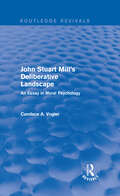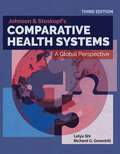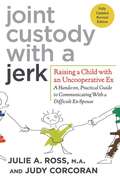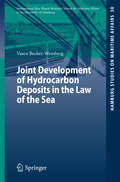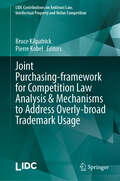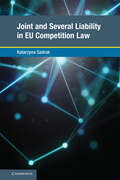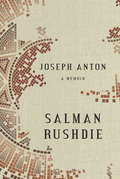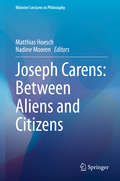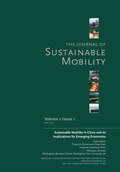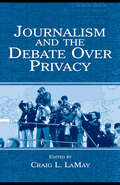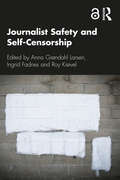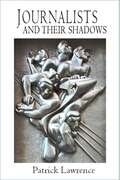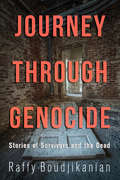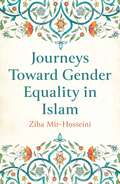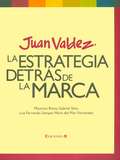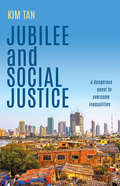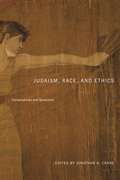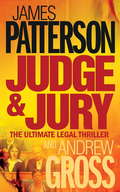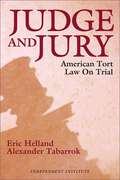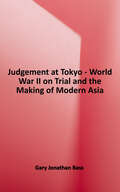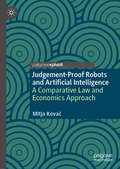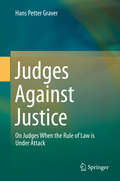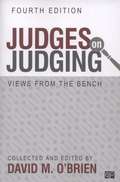- Table View
- List View
John Stuart Mill's Deliberative Landscape: An Essay in Moral Psychology (Studies In Ethics Ser.)
by Candace A. VoglerFirst published in 2001, this book sets out to shed light on traditional controversies in Mill scholarship, underscore the significance of the contribution Mill made to associationist psychology, argue he is not entirely successful in explaining why art matters, and that this failure is linked to a deep tension in his mature work — rooted in his unwillingness to shake off the moral psychology he was raised on. The book examines various episodes and tensions in Mill’s life and work and how they relate to and informed his philosophy — while also giving a critical account of it. This book will be of interest to students of philosophy.
Johnson & Stoskopf's Comparative Health Systems
by Leiyu Shi Richard G. GreenhillJohnson & Stoskopf's Comparative Health Systems: A Global Perspective explores the evolving landscape of health care delivery worldwide. Part I introduces fundamental concepts including health and disease, health policy and economics, and the role of international health organizations. Part II delves into the health systems, practices, and policies of over 20 countries, considering factors such as geography, culture, and historical context. Each country is thoroughly assessed in terms of cost, quality, access, and innovation. The third edition examines the impact of the global COVID-19 pandemic on health care systems and the response of different countries. It also addresses other challenges and opportunities, such as global pandemics, disasters, conflicts, changes in the U.S. health system, and the role of non-governmental organizations.Updated throughout, the 3rd edition also offers 13+ new chapters including:Global Health and Disease (3) emphasizes the importance of integration of the healthcare system with the public health system for effective intervention in the cycles of diseasesDistinct chapters on 10 new countries -Cuba, Norway, Finland, Poland, Slovakia, Czech Republic, Egypt, South Africa, Taiwan, and SingaporeThe Business of Health Care (27) discusses value-based care and long-term care as it relates to the business of healthcare.11 Bonus Chapters in the eBook, including a new chapter on the Sustainable Development Goals (SDGs) along with 10 chapters covering the health systems and policies of 10 additional countries including Peru, Ireland, Finland, Türkiye, Poland, Nigeria, Botswana, and more. Comparative Health Systems, Global Health Systems, or World Health Systems courses in Health Administration, Public Health, Nursing and other allied health programs. © 2026 | 600 pages
Joint Custody With A Jerk: Raising A Child With An Uncooperative Ex - A Hands-on, Practical Guide To Communicating With A Difficult Ex-spouse
by Ross Corcoran Julie Ross Judy CorcoranFrom parenting expert Julie A. Ross and writer Judy Corcoran comes the fully revised Joint Custody with a Jerk, the highly praised guide to co-parenting with an uncooperative ex-spouse, now updated to provide real solutions to tough family issues. It's a fact that parenting is hard enough in a family where two parents love and respect each other... After divorce, when the respect has diminished and the love has often turned to intense dislike, co-parenting can be nearly impossible, driving one or both parents to the brink of insanity. Joint Custody with a Jerk offers many proven communication techniques that help you deal with your difficult ex-husband or ex-wife. By outlining common problems and teaching tools to examine your own role in these sticky situations, this book conveys strategies for effective mediation that are easy to apply, sensible, timely and innovative. This revised edition of a bestselling classic sheds light on how today's digital forms of communication can both hurt and help in custody conflicts, and offers updated information throughout that brings age-old issues into the present day.
Joint Development of Hydrocarbon Deposits in the Law of the Sea
by Vasco Becker-WeinbergThis book examines the concept and purpose of joint development agreements of offshore hydrocarbon deposits from the perspective of public international law and the law of the sea, taking into consideration and extensively reviewing State practice concerning seabed activities in disputed maritime areas and when hydrocarbon deposits extend across maritime boundaries. It distinguishes between agreements signed before and after the delimitation of maritime boundaries and analyzes the relevance of natural resources or unitization clauses included in maritime delimitation agreements. It also takes into consideration the relation between these resources and maritime delimitation and analyzes all the relevant international jurisprudence. Another innovative aspect of this book is that it examines the possibility of joint development of resources that lay between the continental shelf and the Area, considering both theoretical and practical problems. As such, the book is a useful tool for scholars and experts on public international law and the law of the sea, but also for national authorities and practitioners of international disputes resolution, as well as public and private entities working in the oil and gas industry.
Joint Purchasing-framework for Competition Law Analysis & Mechanisms to Address Overly-broad Trademark Usage (LIDC Contributions on Antitrust Law, Intellectual Property and Unfair Competition)
by Bruce Kilpatrick Pierre KobelThis volume of the LIDC contributions covers a competition law assessment of buying alliances as well as the topic of overbroad registrations and trademark clogging. It contains a series of national reports prepared to assist the International Rapporteurs in reporting to the LIDC Congress in Gothenburg in September 2023. The first part focuses on how competition law assesses coordinated conduct by buyers, such as joint purchasing/buying alliances. Different jurisdictions have taken a range of approaches to this issue and the reports summarise the current situation, explore the boundary between legitimate and infringing conduct and consider the extent to which further guidance from competition authorities and/or courts is required in order to enable companies to distinguish clearly between legitimate and efficient conduct and infringements of competition law. The conduct of buyers in their interactions with suppliers and markets when purchasing goods and services has recently come under increased scrutiny from a competition law perspective and guidance has been issued by the European Commission and by some national competition authorities. At the same time, there has been an increase in enforcement activity in the area of buyers’ cartels and purchase price fixing (such as the Ethylene and Car Battery Recycling cases) and this is explored in the reports. The second part focuses on intellectual property and, in particular, what mechanisms exist to avoid over-broad trademarks and address concerns that the trademark registers are clogged. Academics, practitioners and some regulators have raised concerns regarding potential for uncertainty regarding the scope of protection and increased costs for third parties wishing to register new trademarks. The reports focus on the bad faith standard in the long running Sky v SkyKick case and the effectiveness of mechanisms to tackle this issue by preventing or removing overbroad trademarks and ensuring the integrity of the registration system.
Joint and Several Liability in EU Competition Law (Global Competition Law and Economics Policy)
by Katarzyna SadrakContribution claims in antitrust are controversial and under-researched in the legal literature. This book provides the first comprehensive analysis of contribution claims in EU competition law. By drawing on the historical and current practice of EU and national courts, as well as national laws of major EU jurisdictions, it explains contribution claims in antitrust law in concrete and practical terms. It also provides much needed clarity on the relationship between competition law and joint and several liability, as well as guiding those concerned by contribution claims through the issues that are likely to arise. Topics examined include the requirements competition law sets for contribution claims; the criteria for dividing antitrust liability between individual co-infringers; the impact of EU Directive 2014/10; and whether liability sharing agreements can resolve the problems joint and several liability brings to EU competition law.
Joseph Anton: A Memoir
by Salman RushdieOn February 14, 1989, Valentine's Day, Salman Rushdie was telephoned by a BBC journalist and told that he had been "sentenced to death" by the Ayatollah Khomeini. For the first time he heard the word fatwa. His crime? To have written a novel called The Satanic Verses, which was accused of being "against Islam, the Prophet and the Quran." So begins the extraordinary story of how a writer was forced underground, moving from house to house, with the constant presence of an armed police protection team. He was asked to choose an alias that the police could call him by. He thought of writers he loved and combinations of their names; then it came to him: Conrad and Chekhov--Joseph Anton. How do a writer and his family live with the threat of murder for more than nine years? How does he go on working? How does he fall in and out of love? How does despair shape his thoughts and actions, how and why does he stumble, how does he learn to fight back? In this remarkable memoir Rushdie tells that story for the first time; the story of one of the crucial battles, in our time, for freedom of speech. He talks about the sometimes grim, sometimes comic realities of living with armed policemen, and of the close bonds he formed with his protectors; of his struggle for support and understanding from governments, intelligence chiefs, publishers, journalists, and fellow writers; and of how he regained his freedom. It is a book of exceptional frankness and honesty, compelling, provocative, moving, and of vital importance. Because what happened to Salman Rushdie was the first act of a drama that is still unfolding somewhere in the world every day.Praise for Salman Rushdie "In Salman Rushdie . . . India has produced a glittering novelist--one with startling imaginative and intellectual resources, a master of perpetual storytelling."--The New Yorker "Salman Rushdie has earned the right to be called one of our great storytellers."--The Observer "Our most exhilaratingly inventive prose stylist, a writer of breathtaking originality."--Financial Times
Joseph Carens: Between Aliens and Citizens (Münster Lectures in Philosophy #6)
by Matthias Hoesch Nadine MoorenThis book offers a critical discussion of Joseph Carens’s main works in migration ethics covering themes such as migration, naturalization, citizenship, culture, religion and economic equality. The volume is published on the occasion of the annual Münster Lectures in Philosophy held by Joseph Carens in the fall of 2018. It documents the intellectual exchange with the well-known philosopher Joseph Carens by offering critical contributions on Carens’s work and commentaries of Carens as a reply to these critical contributions. With his various works on migration ethics, Joseph Carens must be seen as one of the leading academics in the political and ethical discourse of migration in the last years. The topic of migration raises questions not only regarding naturalization and citizenship but also cultural, economic and religious differences between aliens, citizens and persons whose status lies in between and calls for further determination. Such questions gain more and more importance in our globalized world as can be seen for example in the context of the refugee crisis in the European Union and the U.S. The book covers different systematic topics of Carens’s work as can be found in his widely read book “The Ethics of Immigration” but also in further publications. It provides papers with critical discussions of Carens’s work as well as his responses to these, thus enabling and documenting the fruitful dialogue between the contributors and Carens himself. The aim of this book is to sharpen and shed light on Carens’s arguments concerning migration by offering new and critical perspectives and fine-grained analyses.
Journal of Sustainable Mobility Vol. 2 Issue 1: Sustainable Mobility in China and its Implications for Emerging Economies
by Michael Zhang Fuquan Zhao Han HaoAfter three decades of rapid economic growth, China became the world’s second largest economy in 2010 after the United States of America. Along with the prospect of lifting millions out of poverty and improving living standards, China is facing yet new challenges of rapid urbanization. Recent research findings show that in 2012 urbanization rate was 52.6% in China (Lacy et al., 2013). It is predicted that by 2020 the number of megacities in China with an urban population of more than 10 million will increase to thirteen. Along with the increase in urban population and living standards there has been rapid increase of car ownership in China. It is estimated that there are more than five million vehicles in Beijing (Cheng, 2013; Economist, 2013). Large cities and prefecture-level cities already contributed 89.6% of China’s total industrial CO2 emissions. One day in January 2013 air in Beijing was heavily polluted to a level of toxicity (smog) forty times the standard safe level set by the World Health Organization (Economist, 2013).At the international level, transport contributed 61.5% to world petroleum consumption and 22.3% to global CO2 emissions in 2010 (IEA, 2012). While the overall level of CO2 emissions in developed economies is stabilizing and in some cases declining, the levels in the developing and emerging economies are increasing. Large emerging economies with megacities will imminently become the major concerns of transport-related CO2 emissions. Without strategic innovations in the automotive industry and transport management system the current state of China’s transport sector is not sustainable. The long-term sustainable solutions are likely to emerge from the interplay of economic, environmental, social and technological factors.The Special Issue, partnered with the Second International Symposium on Sustainable Mobility, focuses on the issues of developing policies and corporate strategies to help the automotive industry, transport management systems, and urban planning to embark on a sustainable path to future growth and development (WBCSD, 2007; World Bank, 2008). The critical debate and research findings of this issue shed light on future research and practice on sustainable mobility in emerging economies.
Journalism and the Debate Over Privacy (Routledge Communication Series)
by Craig L. LaMayJournalism and the Debate Over Privacy situates the discussion of issues of privacy in the landscape of professional journalism. Privacy problems present the widest gap between what journalism ethics suggest and what the law allows. This edited volume examines these problems in the context of both free expression theory and newsroom practice. Including essays by some of the country's foremost First Amendment scholars, the volume starts off in Part I with an examination of privacy in theoretical terms, intended to start the reader thinking broadly about conceptual problems in discussions about journalism and privacy. Part II builds on the theoretical underpinnings and looks at privacy problems as they are experienced by working journalists. This volume features discussion of: *privacy as a socially-constructed right--a moving target that changes with technology, social norms, national experience, and journalistic practice; *privacy as both a property and a commercial right; *privacy in terms of journalism ethics and journalistic codes; *privacy as an attribute of press independence from government; and *Bartnicki v. Vopper and its implications for journalism. With this volume, editor Craig L. LaMay provides a concise, intellectually provocative overview of a topic that is of growing importance to journalists, both legally and ethically. The work is intended for scholars and advanced students in communication law, ethics, and First Amendment rights, and is also appropriate for First Amendment and media law classes in law schools.
Journalist Safety and Self-Censorship
by Ingrid Fadnes Anna Gr Roy KrThis book explores the relationship between the safety of journalists and self-censorship practices around the world, including local case studies and regional and international perspectives. Bringing together scholars and practitioners from around the globe, Journalist Safety and Self-Censorship provides new and updated insights into patterns of self-censorship and free speech, focusing on a variety of factors that affect these issues, including surveillance, legislation, threats, violent conflict, gender-related stereotypes, digitisation and social media. The contributions examine topics such as trauma, risk and self-censorship among journalists in different regions of the world, including Central America, Estonia, Turkey, Uganda and Pakistan. The book also provides conceptual clarity to the notion of journalist self-censorship, and explores the question of how self-censorship may be studied empirically.Combining both theoretical and practical knowledge, this collection serves as a much-needed resource for any academic, student of journalism, practicing journalist, or NGO working on issues of journalism, safety, free speech and censorship.
Journalists and Their Shadows
by Patrick LawrencePART MEMOIR, PART SOCIAL HISTORY, Journalists and Their Shadows captures the deplorable state of the American media in our time—recording its deterioration, its moments of crisis, and ultimately, its transformation as seen through the eyes of a journalist engaged at its very heart through all its phases. The press had a bad Cold War, Patrick Lawrence contends, and never recovered from it, having never acknowledged its errors and so unable to learn from them. Its dysfunctional relationship with the national security state today is strikingly reminiscent of how it was in the Cold War’s earliest days. With remarkable fidelity, all the old errors are being repeated. As a result, the mainstream American media have entered into a period of profound transformation, in the course of which independent media are emerging as the profession’s most dynamic sector—and represent, indeed, the promise of a brilliant future. A weave of three elements, Lawrence’s book offers a searing cultural and political critique, punctuated by the kind of piquant detail only insiders can provide. He also makes the case for a way forward—an optimistic case based on the vitality now apparent among independent media. Here, too, he is at home, providing the book’s most original coverage of this brave new world. He draws upon many years in the profession, a multitude of mainstream outlets ranging from his decades as foreign correspondent for the venerable International Herald Tribune to his work now as a columnist for a similar wide range of alternative news outlets such as Counterpunch and Consortium News. 'Shadows' probes the psychological dilemma that must be understood if we are to address the current crisis. Journalists in our time are divided within themselves—driven to meet thoroughly professional but ideologically conformist standards, but on the other, subliminally struggling to breach the barriers that preclude the truths they know should be conveyed. This latter, as Jung has put it, is the journalist’s shadow. Shadows’ case for the reintegration of the divided journalist is striking and original. This record of the American media’s increasingly shabby betrayal of the public trust sheds light on why the American public thought and thinks the way it does, how it has become aware that the truth it seeks is absent, and where and how it may yet be able to ferret it out. Here is a guide to the future, in fact, of journalism itself.
Journey through Genocide: Stories of Survivors and the Dead
by Raffy BoudjikanianPowerful accounts by genocide survivors, a journalist seeking to bear witness to their pain. Darfuri refugee camps in Chad, Kigali in Rwanda, and the ruins of ancient villages in Turkey — all visited by genocide, all still reeling in its wake. In Journey through Genocide, Raffy Boudjikanian travels to communities that have survived genocide to understand the legacy of this most terrible of crimes against humanity. In this era of ethnic and religious wars, mass displacements, and forced migrations, Boudjikanian looks back at three humanitarian crises. In Chad, meet families displaced by massacres in the Darfur region of neighbouring Sudan, their ordeal still raw. In Rwanda, meet a people struggling with justice and reconciliation. And in Turkey, explore what it means to still be afraid a century after the author’s own ancestors were caught in the Armenian Genocide of 1915. Clear-eyed and compassionate, Boudjikanian breathes life into horrors that too often seem remote.
Journeys Toward Gender Equality in Islam
by Ziba Mir-HosseiniIf justice is an intrinsic value in Islam, why have women been treated as second-class citizens in Islamic legal tradition? Today, the idea of gender equality, inherent to contemporary conceptions of justice, presents a challenge to established, patriarchal interpretations of Shari&‘a. In thought-provoking discussions with six influential Muslim intellectuals – Abdullahi An-Na&’im, Amina Wadud, Asma Lamrabet, Khaled Abou El Fadl, Mohsen Kadivar and Sedigheh Vasmaghi – Ziba Mir-Hosseini explores how egalitarian gender laws might be constructed from within the Islamic legal framework.
Juan Valdéz. La estrategia detrás de la marca
by Varios AutoresLa estrategia para posicionar a una de las marcas más icónicas del país. Juan Valdez, su mula Conchita y el paisaje montañoso son la imagen del café colombiano en el mundo. Estos tres íconos han impulsado la imagen del café colombiano y a lo largo de 50 años de existencia, han sufrido una serie de transformaciones que han ayudado a que hoy se reconozca el café colombiano como el más rico del mundo.
Jubilee and Social Justice: A Dangerous Quest to Overcome Inequalities
by Tan, Kim“Impact Investor” Kim Tan challenges the church to ask whether or not the gospel as we interpret it today really embodies the jubilee vision of the Bible. Imagine a group of forty adults living in a community, assisting each other to buy houses, sharing material wealth and releasing the surplus to help others as a practical outworking of the biblical principles of jubilee. Kim Tan was part of this group who defined principles of sacrificial generosity, stewardship, and social holiness.This book is in two parts. First it walks through the Old Testament on the Jubilee program as given in the covenant to Israel at Mt. Sinai. An idealistic vision was followed by the failure of Israel to practice this teaching. We trace the Jubilee practices in the New Testament through the early Church and later Church history. The second part focuses on modern expressions of Jubilee as it has caught the imagination of various individuals and groups working out different aspects of the Jubilee in their lives. Modern expressions of the biblical Jubilee include: 1. Communities sharing goods2. Wealth creation & distribution3. Cancellation of debt4. Feeding the widows5. Set the captives free6. Stewarding the environment
Judaism, Race, and Ethics: Conversations and Questions (Dimyonot)
by Jonathan K. CraneRecent political and social developments in the United States reveal a deep misunderstanding of race and religion. From the highest echelons of power to the most obscure corners of society, color and conviction are continually twisted, often deliberately for nefarious reasons, or misconstrued to stymie meaningful conversation. This timely book wrestles with the contentious, dynamic, and ethically complicated relationship between race and religion through the lens of Judaism. Featuring essays by lifelong participants in discussions about race, religion, and society— including Susannah Heschel, Sander L. Gilman, and George Yancy—this vibrant book aims to generate a compelling conversation vitally relevant to both the academy and the community. Starting from the premise that understanding prejudice and oppression requires multifaceted critical reflection and a willingness to acknowledge one’s own bias, the contributors to this volume present surprising arguments that disentangle fictions, factions, and facts. The topics they explore include the role of Jews and Jewish ethics in the civil rights movement, race and the construction of American Jewish identity, rituals of commemoration celebrating Jewish and black American resilience, the “Yiddish gaze” on lynchings of black bodies, and the portrayal of racism as a mental illness from nineteenth-century Vienna to twenty-first-century Charlottesville. Each essay is linked to a classic Jewish source and accompanied by guiding questions that help the reader identify salient themes connecting ancient and contemporary concerns.In addition to the editor, the contributors include Sander L. Gilman, Annalise E. Glauz-Todrank, Aaron S. Gross, Susannah Heschel, Sarah Imhoff, Willa M. Johnson, Judith W. Kay, Jessica Kirzane, Nichole Renée Phillips, and George Yancy.
Judaism, Race, and Ethics: Conversations and Questions (Dimyonot: Jews and the Cultural Imagination #8)
by Jonathan K. CraneRecent political and social developments in the United States reveal a deep misunderstanding of race and religion. From the highest echelons of power to the most obscure corners of society, color and conviction are continually twisted, often deliberately for nefarious reasons, or misconstrued to stymie meaningful conversation. This timely book wrestles with the contentious, dynamic, and ethically complicated relationship between race and religion through the lens of Judaism. Featuring essays by lifelong participants in discussions about race, religion, and society— including Susannah Heschel, Sander L. Gilman, and George Yancy—this vibrant book aims to generate a compelling conversation vitally relevant to both the academy and the community. Starting from the premise that understanding prejudice and oppression requires multifaceted critical reflection and a willingness to acknowledge one’s own bias, the contributors to this volume present surprising arguments that disentangle fictions, factions, and facts. The topics they explore include the role of Jews and Jewish ethics in the civil rights movement, race and the construction of American Jewish identity, rituals of commemoration celebrating Jewish and black American resilience, the "Yiddish gaze" on lynchings of black bodies, and the portrayal of racism as a mental illness from nineteenth-century Vienna to twenty-first-century Charlottesville. Each essay is linked to a classic Jewish source and accompanied by guiding questions that help the reader identify salient themes connecting ancient and contemporary concerns.In addition to the editor, the contributors include Sander L. Gilman, Annalise E. Glauz-Todrank, Aaron S. Gross, Susannah Heschel, Sarah Imhoff, Willa M. Johnson, Judith W. Kay, Jessica Kirzane, Nichole Renée Phillips, and George Yancy.
Judge and Jury
by James Patterson Andrew GrossAndie DeGrasse, aspiring actress and single mother, does not want to do jury service. But despite her attempts to get dismissed, she still ends up as Juror No.11 in a landmark trial against notorious Mafia Don, Dominic Cavello.Cavello, A.K.A the Electrician, is linked to hundreds of unspeakable crimes and his power knows no bounds. But Senior FBI agent Nick Pellisante has been tracking him for years and conviction is a sure thing. As the jury reaches its verdict, the Electrician makes a devastating move. The entire nation is reeling, and Andie's world is shattered. The hunt for Cavello just got personal, and she and Pellisante join together, determined to exact justice - at any cost.
Judge and Jury: American Tort Law on Trial
by Alexander Tabarrok Eric HellandWith inordinate amounts of money spent in the United States on lawyers and lawsuits and multi-billion-dollar settlements growing each year, the very timely book Judge and Jury asks, "Is the tort system benefiting the public?"In Judge and Jury, the fear of litigation is shown to reduce innovations, drive physicians and manufacturers out of lawsuit-prone specialties, and increase manufacturing and consumer costs. In the courts, data from thousands of cases all over the country demonstrate that tort system awards are driven by political factors such as judicial elections, jury compositions, and the location of courts themselves. This book assembles the unprecedented findings and insights by authors Eric Helland Alexander Tabarrok, who have pioneered economic and legal research into the injustice and enormous costs created by the politicization of the tort law. Seeking to reverse the extremely harmful trends in tort law, Judge and Jury assembles innovative alternatives for reforming the tort system and charts a course toward re-establishing fair civil justice for all in the United States.
Judgement at Tokyo: World War II on Trial and the Making of Modern Asia
by Gary Jonathan BassFrom the author of the acclaimed The Blood Telegram and finalist for the Pulitzer Prize for General Non-Fiction, comes a landmark, magisterial history of the trial of Japan’s leaders as war criminals—the largely overlooked Asian counterpart to Nuremberg. In the weeks after Japan finally surrendered to the Allies to end World War II, the victorious powers turned to the question of how to move on from years of carnage and destruction. For American leaders President Harry Truman and General Douglas MacArthur, Britain’s Winston Churchill, China’s Chiang Kai-shek, and their fellow victors, the question of justice seemed clear: Japan’s militaristic leaders needed to be tried and punished for their crimes. For the Allied powers, the trials were an opportunity both to render judgment on their vanquished foes and to create a legal framework to prosecute war crimes and prohibit the use of aggressive war. For the Japanese leaders on trial, it was their chance to argue that their war had been waged to liberate Asia from Western imperialism and that the court was no more than victors’ justice. For more than two years, the tensions and contradictions of the courtroom could be seen playing out across Asia as the trial unfolded in the crucial early years of the Cold War and the end of the European empires. They have influenced power politics across Asia and the Pacific ever since. Gary J. Bass' Judgement at Tokyo is the product of a decade of research, a magnificent, riveting story of wartime action, dramatic courtroom battles, and the epic formative years that set the stage for the postwar era in the Asia–Pacific.
Judgement-Proof Robots and Artificial Intelligence: A Comparative Law and Economics Approach
by Mitja KovačThis book addresses the role of public policy in regulating the autonomous artificial intelligence and related civil liability for damage caused by the robots (and any form of artificial intelligence). It is a very timely book, focusing on the consequences of judgment proofness of autonomous decision-making on tort law, risk and safety regulation, and the incentives stemming from these. This book is extremely important as regulatory endeavours concerning AI are in their infancy at most, whereas the industry’s development is continuing in a strong way. It is an important scientific contribution that will bring scientific objectivity to a, to date, very one-sided academic treatment of legal scholarship on AI.
Judges Against Justice
by Hans Petter GraverThis book explores concrete situations in which judges are faced with a legislature and an executive that consciously and systematically discard the ideals of the rule of law. It revolves around three basic questions: What happen when states become oppressive and the judiciary contributes to the oppression? How can we, from a legal point of view, evaluate the actions of judges who contribute to oppression? And, thirdly, how can we understand their participation from a moral point of view and support their inclination to resist?
Judges On Judging: Views From the Bench (Fourth Edition)
by David M. O'BrienThoroughly revised and updated for this fourth edition, Judges on Judging offers insights into the judicial philosophies and political views of those on the bench. Broad in scope, this one-of-a-kind book features off-the-bench writings and speeches in which Supreme Court justices, as well as lower federal and state court judges, discuss the judicial process, constitutional and statutory interpretation, judicial federalism, and the role of the judiciary. Engaging introductory material provides students with necessary thematic and historical context making this book the perfect supplement to present a nuanced view of the judiciary.
